SEO Pricing – What Does SEO Cost in 2025?
Editor’s Note: This post was originally published in March of 2020 and was updated in November 2025 for accuracy and comprehensiveness.
An online presence is essential for any business in 2025.
The internet presents a world of possibilities that simply didn’t exist 25 or 30 years ago.
But to tap into the online world’s massive customer base, your business must first be found.
Remember, you could have the most exceptional website in the world, but if customers can’t find it, you won’t generate leads or make any sales.
So, how can you make it easier for potential customers to find you online?
Search engine optimization.
We like to think of SEO as a marketing superpower. When done correctly, there’s no better way to get your business in front of customers.
But how much does SEO cost to run an SEO campaign in 2025? Is it worth the money? And most importantly, what kind of return on investment can you expect?
In this article, we’ll break down the basics of SEO, why it’s so valuable, and what you can expect to pay for it in 2025.
What is SEO?
SEO is an ongoing process of improving your website’s ability to rank prominently for relevant queries in search engines like Google.
When someone Googles something related to your brand, product, or service, you want to show up. By using search engine optimization, you will.
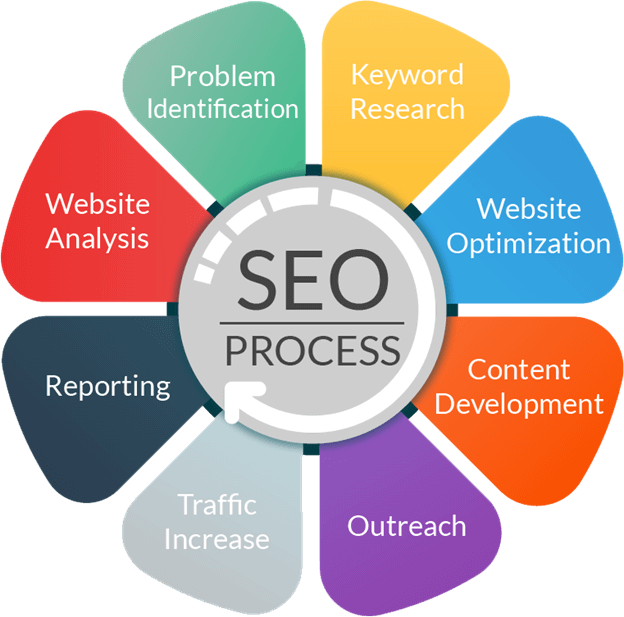
Since Google accounts for over 90% of the worldwide search engine market share, that’s the service we’ll be focusing on today.
Of course, both Bing and Yahoo are great, and you should take their algorithms into account. But Google is the big dog in the search engine yard.
Unfortunately, Google doesn’t do you any favors if you’re not at the top of the search results. The average top-ranking organic result enjoys a 22.4% click-through rate. Meanwhile, fewer than 1% of searchers click a result on the second page.
The lesson? You need to optimize your site if you want to be found.
SEO makes it easier for Google’s search bots to discover your site and determine its relevance for specific search queries. SEO consists of three central pillars: on-page SEO, off-page SEO, and technical SEO. Employing skilled SEO professionals is crucial in managing these aspects effectively, ensuring adherence to Google’s EEAT standards and overall SEO success.

On-page SEO
On-page SEO involves optimizing various elements of your website for search engines.
This includes strategically incorporating keywords into your page content, titles, meta descriptions, and headers. Of course, these keywords shouldn’t be picked out of a hat. They should be based on thorough keyword research to ensure you’re targeting relevant terms that people are actually searching for. Utilizing SEO tools like Google Analytics, Ahrefs, and SEMrush can significantly enhance your keyword research and on-page optimization efforts.
It is also important to incorporate keywords into image titles and alt text since Google’s bots can’t interpret images themselves. They know that the image is there—they just don’t know what it is. So, if you have a photo of a sailboat on the page, adding ‘sailboat’ to the image title and alt text lets Google understand the content of the image.
Crosslinking between pages on your site is another essential component of on-page SEO. Creating a network of internal links makes it easier for users and search engines to navigate and helps to distribute valuable link equity (ranking power) throughout your site.
Lastly, effective on-page SEO involves regularly updating your website content. Non-stop competitor activity and ever-evolving search engine algorithms mean staying static is not an option. To maintain and improve your rankings, you need to keep content fresh, relevant, and aligned with current SEO best practices.
Since 2009, we have helped thousands of businesses grow their online leads and sales strategically. Let us do it for you!

Off-page SEO
Off-page SEO refers to actions taken outside your website that nevertheless impact its search rankings.
The main consideration for off-page SEO is link building. Acquiring high-quality links from relevant and reputable websites lets Google know that your site is credible and worthy of a place in its search results.
Building a strong backlink profile is one of the most challenging aspects of SEO. SEO campaigns often include extensive link-building efforts. But the effort is worth it. Around 68% of SEO experts say that building links from other sites positively impacts rankings and traffic.
Another vital piece of the off-page SEO puzzle is bolstering your online presence and reputation through social media. Active and engaging social media profiles, linked to your website, generate buzz around your brand and can contribute to your overall SEO efforts.
Technical SEO
Technical SEO encompasses optimizing site performance and other backend elements to improve your website’s crawlability and user experience. SEO companies often specialize in these technical aspects.
One of the biggest technical considerations is to ensure your website loads quickly and works equally well on mobile and desktop. Keep in mind that 63% of organic traffic in the U.S. comes from mobile devices. Also, Google now uses the mobile version of a site to determine search result listings. So, if your site isn’t mobile-friendly, you’ll miss out on rankings and traffic. For more information about how you can learn more about SEO, click here.
Do you need SEO?
You absolutely need SEO if you want to remain competitive in today’s digital marketplace.
As we’ve already mentioned, ranking on the first page of search results is vital in order for potential customers to discover your brand online.
The better you rank in the search results, the more organic traffic you’ll attract. This means more leads, more conversions, and more profit.
You should make it a priority to rank among the top results for the most relevant keywords associated with your business. Many businesses opt for monthly SEO services to maintain and improve their rankings.
Why? The potential for a return on investment is enormous. That’s probably why 49% of marketers believe organic search is the most profitable channel they use.

Organic search also drives over ten times more traffic than organic social media.
Of course, social media is essential, and you still need it to be successful. But it’s a piece of the overall marketing puzzle. SEO is a bigger piece.
As you’ve seen, a lot goes into making SEO a success. So, unless you’re an expert or have a dedicated team of search specialists in-house, we advise against running an SEO campaign yourself. Instead, it may be worth hiring the services of SEO specialists. But first, you need to understand what you should be paying.
What should you spend on SEO services per month?
Before you start shopping around for suitable SEO providers, you first need to develop a smart budget tailored to the specific needs of your business.
What’s suitable for one company might cause ruin for another. How much you can afford is all determined by your specific business circumstances.
However, as with most things, there’s a “you get what you pay for” reality to SEO services.
If you come across an SEO firm that significantly undercuts its competitors, don’t be fooled. Discount SEO services are often too good to be true.
So, what can you expect to pay per month for SEO service costs in 2025?
A recent study by Ahrefs found that 68.8% of SEO providers charge less than $2,001 per month for their services. Around 20% of providers charge somewhere in the $501 to $1,000 range.
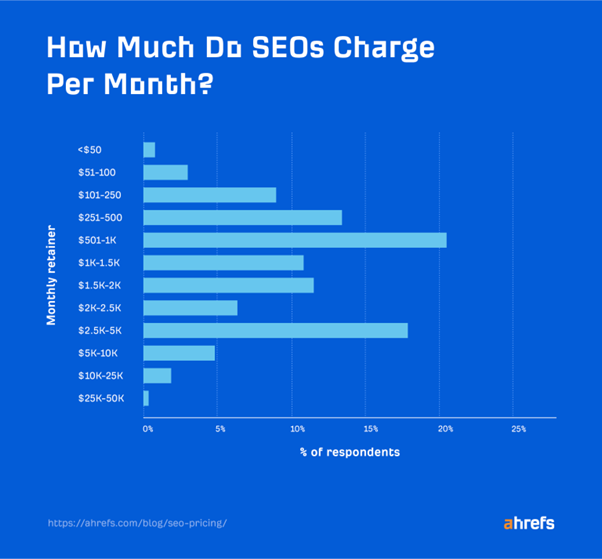
These figures closely correspond to results from a separate study by Backlinko, which found that the average cost of a monthly SEO retainer is $497.
However, the same study found that companies that spend more than $500 per month on SEO are far more likely to be satisfied with the service than those spending less than $500 per month.
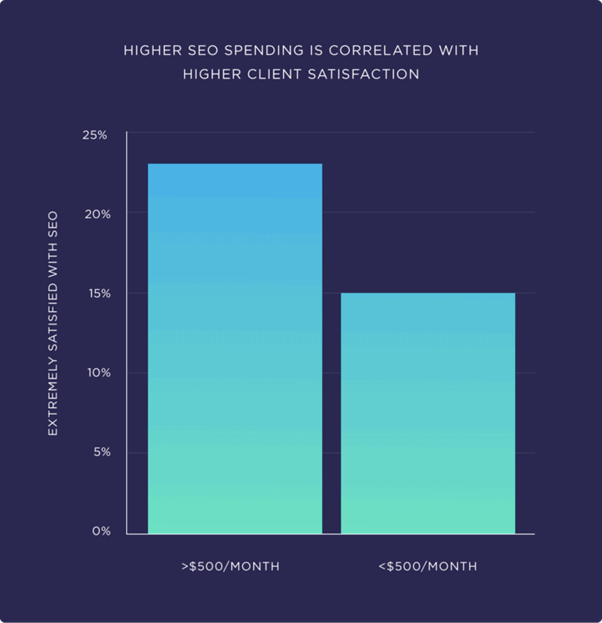
As we’ve already hinted at, smaller discount SEO firms tend to cut corners. They typically use “black hat SEO” tactics or fail to devote the necessary time and resources to your campaign. When that happens, it’s like you’re throwing money in the trash. What you initially think of as affordable SEO turns out to cost you more in the long run.

So, a typical SEO budget falls anywhere between $400 and $10,000 per month. Again, this is subject to the size of your business, the amount of competition you have, and the level of service you need.
You should be suspicious of any SEO agency or freelancer that offers the same flat rate for all their clients. The scope and price of every SEO program should be based on the client’s individual needs and objectives.
One other thing. It’s important to remember that SEO is not a one-time cost. Unfortunately, you can’t just do SEO for six months, reach the top of the search results, and then put your feet up.
SEO is an ongoing process. It never stops. You rise to the top and then defend your ranking. Remember, you have competitors out there, and they are all gunning for the top of the search engine mountain.
Since 2009, we have helped thousands of businesses grow their online leads and sales strategically. Let us do it for you!

SEO Pricing Comparison by Business Size
Understanding what different businesses typically need helps you determine where you fit. Here’s a breakdown of SEO pricing based on business size and requirements:
| Feature | Small Business | Medium Business | Large Business/Enterprise |
| Monthly Budget | $500-$2,000 | $2,000-$5,000 | $5,000-$10,000+ |
| Website Size | 5-20 pages | 20-100 pages | 100+ pages |
| Target Keywords | 5-15 keywords | 15-30 keywords | 30+ |
| Content Creation | 1-2 posts/month | 4-8 posts/month | 8-15+ posts/month |
| Link Building | 2-5 links/month | 5-10 links/month | 10-20+ links/month |
| Reporting Frequency | Monthly | Bi-weekly | Weekly |
| Dedicated Account Rep | Shared | Yes | Yes (Senior) |
| Custom Strategy | Template-based | Semi-custom | Fully |
Small Business SEO
If you’re a local business, startup, or small company with a limited marketing budget, this tier is where you’ll likely start. At this price point, you’re getting the essentials.
What to expect:
- Basic keyword research targeting 5-15 relevant keywords
- On-page optimization for your main pages
- 1-2 blog posts or content pieces per month
- Basic link building (2-5 quality backlinks monthly)
- Monthly performance reports
- Local SEO setup and optimization
- Google Business Profile management
- Basic technical SEO fixes
What’s typically NOT included:
- Extensive content creation
- Aggressive link building campaigns
- Advanced technical SEO
- Comprehensive competitor analysis
- Video or multimedia content
This tier works well for businesses with minimal online competition or those just starting their SEO journey. You’ll see gradual improvements, but don’t expect overnight miracles. Results typically become noticeable after 4-6 months.
Medium Business SEO
Medium-sized businesses with moderate competition need a more robust approach. This tier offers a comprehensive SEO strategy with dedicated attention.
What to expect:
- Comprehensive keyword research (15-30 keywords)
- Full website optimization and ongoing improvements
- 4-8 high-quality content pieces per month
- Moderate link building (5-10 quality backlinks monthly)
- Bi-weekly reports with detailed analytics
- Advanced technical SEO audits and fixes
- Competitor analysis and monitoring
- Conversion rate optimization
- Social media integration
- Email outreach for link building
At this level, agencies typically assign a dedicated account manager who knows your business intimately. You’re getting strategic planning, not just task execution. The agency proactively identifies opportunities and potential issues.
This tier suits businesses ready to compete seriously in their market. You’ll see more aggressive growth, with meaningful results typically appearing within 3-4 months.
Large Business/Enterprise SEO
Large businesses, ecommerce sites, and enterprises need sophisticated, multi-faceted SEO strategies. At this investment level, you’re getting a full team working on your account.
What to expect:
- Extensive keyword research (30+ keywords, including long-tail variations)
- Enterprise-level technical SEO
- 8-15+ premium content pieces monthly
- Aggressive link building (10-20+ high-authority backlinks)
- Weekly reporting with custom dashboards
- Dedicated senior account strategist
- Full content team (writers, editors, designers)
- Advanced tools and proprietary technology
- International SEO (if applicable)
- Custom tracking and attribution modeling
- Regular strategy sessions and consulting
- Crisis management and reputation monitoring
At this tier, you’re essentially getting an extension of your marketing department. The agency becomes a strategic partner, not just a service provider. They’ll identify emerging trends, pivot strategies based on algorithm changes, and ensure you maintain competitive advantage.
This level makes sense for businesses where a 1% improvement in organic traffic translates to significant revenue. Results appear faster (2-3 months) due to the intensive work and resources dedicated to your campaign.
Keep in mind that these are general guidelines. Your specific needs may vary based on your industry, competition level, and business goals. A local law firm might need more at the small business tier than a national ecommerce store at the same price point.
What’s included in SEO services?
Typical SEO packages from agencies are composed of several work streams. These packages often include various SEO campaigns tailored to different business needs. And suitable firms should be adept at each of them. So, when seeking out potential candidates, ask them to explain how they approach these different aspects of SEO.
Social media optimization
Around 77% of businesses use social media to reach customers and distribute content.
Social media is one of the best avenues for link-building. The more content you share, the more likely other people will share it too.
Content marketing
Content marketing is at the heart of SEO.
Content marketing focuses on developing high-quality content to help you rank for relevant keywords and drive conversions from your visitors.
Conversion analysis
You have to understand where you are to better determine where you have to be.
By analyzing your conversion rate, you can better get an idea of how much organic traffic you have to draw in using SEO in order to achieve your goals.

Link building
We’ve already mentioned the importance of link-building for SEO. But acquiring high-quality backlinks is easier said than done.
Technical optimization
The backend of your site has to be optimized for SEO as well.
Technical issues are usually discovered during an initial SEO audit, which is typically included in a full-service package. This audit will evaluate the current state of various technical elements, including page speed, page experience, website architecture, schema markup, and more.
Local SEO
If your business operates within a specific location, general SEO isn’t enough.
You don’t just want organic traffic to your website. You also want customers in your local area to visit your store or use your services.
Modern consumers increasingly turn to search engines to find businesses in their own neighborhoods. In fact, 77% of consumers use search to find local business information.
This is where local SEO comes into play.
Local SEO is a set of techniques designed to put your company’s website or business information in front of local search users.
Even small changes can make a big difference. For example, 60% of smartphone users have contacted a business directly from the search results page. So, ensuring your phone number appears in your Google Business Profile is just one example of a local SEO tactic.
Auditing
An SEO audit is a foundational step in any SEO strategy, providing a comprehensive evaluation of your website’s current SEO efforts. This process identifies strengths, weaknesses, and opportunities for improvement. The cost of an SEO audit can vary widely, typically ranging from $500 to $30,000, depending on the scope and depth of the analysis. A thorough audit examines various aspects of your site, including technical SEO, on-page elements, and off-page factors. By understanding your current SEO standing, you can develop a tailored strategy that addresses specific areas for improvement, ultimately enhancing your site’s performance in search engine results pages.
What is the typical SEO pricing model?
There’s currently no industry standard for SEO pricing among agencies. SEO companies offer various pricing models based on their services and expertise. It’s up to the consumer to decide if an SEO consultant’s price model is fair and fits into their budget.
That’s why it’s important to create a budget with return on investment (ROI) in mind. Before you enter into an SEO contract with all the bells and whistles, make sure you’re confident it will pay out more than you paid in.
Your overall SEO budget could be anywhere from $500 to $30,000, depending on how much work has to be done.
Here are the four most common payment models SEO agencies use, with detailed explanations of what each one means for your business:
1. Monthly SEO Package (Retainer)
This is by far the most common pricing model for SEO providers. Around 78% of agencies, consultants, and freelancers charge a monthly retainer for their work.
When you’re opting for monthly SEO services, you’re typically paying anywhere from $500 to $5,000 per month.
Under a retainer, you pay a monthly SEO fee for the services you’ve selected, which covers all the time your SEO agency dedicates to your campaign.
How monthly retainers work:
- You sign a contract for a specific period, typically 6-12 months minimum
- The agency allocates a set number of hours per month to your account
- Services are ongoing and cumulative, building on previous months’ work
- You receive regular reports showing progress and results
- The scope of work is defined upfront but can be adjusted as needed
The retainer model creates consistency. Your agency isn’t starting from scratch each month. They’re building on previous work, which creates momentum. Think of it like going to the gym with a personal trainer. One session won’t get you in shape, but consistent training over months delivers results.
Best for: Businesses looking for consistent, long-term SEO growth with predictable monthly costs. This model works well when you need ongoing optimization, content creation, and link building.
Pros:
- Predictable, budgetable costs
- Consistent attention to your website
- Builds momentum over time
- Comprehensive service coverage
- Priority support from your agency
Cons:
- Requires commitment (typically 6-12 months)
- You pay even during slower months
- Harder to measure ROI month-to-month
- Early termination may incur penalties
Red flags to watch for:
- Identical pricing for all clients regardless of needs
- No minimum contract term (suggests low-quality service)
- Vague scope of work
- No clear reporting schedule
2. Fixed-price contract
This SEO pricing model lets clients pay for the specific services that they want. Fixed-price services vary from one agency to the next.
How fixed-price contracts work:
- You purchase specific deliverables with predetermined pricing
- The scope is clearly defined before work begins
- Payment is usually made upfront or in milestones
- Timeline is agreed upon in advance
- Additional work outside the scope requires a new contract or quote
Common fixed-price services and their typical costs:
SEO Audit: $500-$7,500
What you get: Comprehensive analysis of your website’s technical health, on-page optimization, backlink profile, and competitive landscape. Includes actionable recommendations. Small sites cost less, large ecommerce sites cost more.
Content Writing: $0.15-$0.50 per word ($150-$500 per article)
What you get: SEO-optimized blog posts or web pages. Price varies based on research depth, writer expertise, and content complexity. Higher rates typically mean better quality and subject matter expertise.
Technical SEO Fixes: $1,000-$5,000
What you get: Fixing crawl errors, improving site speed, implementing schema markup, resolving duplicate content issues, mobile optimization. Cost depends on site complexity and number of issues.
Website Migration: $2,000-$10,000
What you get: Moving your site to a new domain, platform, or structure without losing SEO value. Includes 301 redirects, updating internal links, and monitoring for issues post-migration.
Local SEO Setup: $500-$3,000
What you get: Google Business Profile optimization, local citations, NAP consistency, review management setup, and local content optimization.
Link Building Campaign: $1,000-$5,000
What you get: Acquisition of high-quality backlinks through outreach, content creation, and relationship building. Price depends on the number and quality of links.
Best for: Businesses with specific, one-time needs or those who want to test an agency before committing to ongoing services. Also ideal when you have a defined project with clear deliverables.
Pros:
- Clear scope and expectations
- Know total cost upfront
- No long-term commitment
- Good for specific problems
- Easy to compare prices between agencies
Cons:
- Can be more expensive per task
- Doesn’t create ongoing momentum
- May need multiple contracts for comprehensive SEO
- Changes to scope require renegotiation
Red flags to watch for:
- Pressure to commit without clear scope document
- Unrealistically low prices (suggests corner-cutting)
- Vague deliverables
- No revision policy
3. Project-based pricing
Project fees are another common pricing model used by around 49% of SEO service providers for some or all of their work.
The great advantage of this model is its simplicity. Essentially, you’re paying a predetermined fee for a complete project with defined outcomes. Roughly 83% of SEO providers in North America charge over $1,000 for a typical project.
How project-based pricing works:
- You define the project scope and desired outcomes
- Agency provides a total project cost
- Work is completed within an agreed timeframe
- Payment often structured in milestones
- Project concludes when deliverables are met
Typical project-based engagements:
Complete Website SEO Overhaul: $5,000-$30,000
What you get: Full audit, technical fixes, on-page optimization for all pages, content strategy, initial content creation, and foundational link building. Essentially everything needed to launch a competitive SEO presence.
Content Hub Development: $3,000-$15,000
What you get: Research, planning, and creation of a comprehensive content cluster around a core topic. Includes 1 pillar page and 8-12 supporting articles, all internally linked and optimized.
Ecommerce SEO Launch: $10,000-$50,000
What you get: Category page optimization, product page templates, technical SEO for large sites, faceted navigation optimization, schema implementation, and initial content strategy.
SEO Recovery Project: $5,000-$20,000
What you get: Analysis of penalty or traffic drop, development of recovery plan, implementation of fixes, disavow file creation if needed, and monitoring through recovery period.
The project-based model works well when there’s a clear beginning and end. You’re not paying for ongoing services you might not need. Once the project is complete, you can choose to continue with a retainer or handle maintenance yourself.
Best for: Businesses launching new sites, recovering from penalties, or undertaking major website changes. Also good for those who want to invest heavily upfront then manage SEO in-house.
Pros:
- Clear deliverables and timeline
- Total cost known upfront
- Intensive focus on your project
- No ongoing commitment after completion
- Can create quick momentum
Cons:
- Expensive upfront investment
- Results still take time despite intensive work
- SEO maintenance falls to you after project ends
- May not address ongoing algorithm changes
So, depending on the level of service you need, you can expect to pay anywhere up to $50,000 per project.
Red flags to watch for:
- No communication plan during project
- Guaranteed rankings or timelines
- No clear project scope document
- Payment required 100% upfront
4. Hourly rate
Hourly rates are considered consultation fees. Much like working with an attorney, the firm will keep a running log of the hours that they spend working on your SEO strategy.
It’s not uncommon to see hourly pricing up to $300 per hour, with around 47% of providers charging between $75 and $200 per hour.
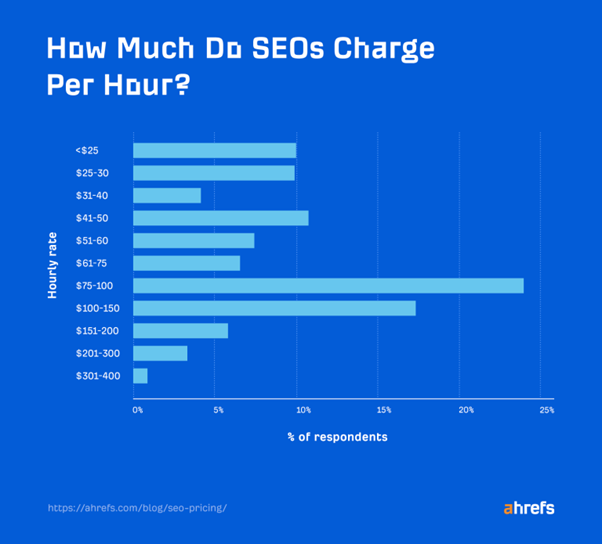
How hourly pricing works:
- You’re billed for actual time spent on your account
- Detailed time logs show what work was performed
- No predetermined scope, allowing flexibility
- Can scale up or down based on needs
- Usually billed monthly or bi-weekly
What impacts hourly rates:
Experience Level:
- Junior SEO specialist: $50-$100/hour
- Mid-level SEO professional: $100-$175/hour
- Senior SEO strategist: $175-$250/hour
- SEO director/consultant: $250-$400/hour
Geographic Location:
- Agencies in major metros (NYC, SF, LA): $150-$300/hour
- Mid-sized cities: $100-$200/hour
- Smaller markets or remote: $75-$150/hour
Expertise Type:
- General SEO: Standard rates
- Technical SEO specialist: +20-30%
- Enterprise SEO: +30-50%
- Ecommerce SEO: +20-40%
Typical hourly engagements:
SEO Consulting: $150-$300/hour
What you get: Strategic guidance, problem-solving, training your team, auditing current efforts, and developing roadmaps. Usually requires 2-10 hours per month.
On-demand SEO Support: $100-$200/hour
What you get: Ad-hoc help with specific issues, questions, or small optimizations. Ideal for businesses with in-house teams who need occasional expert input.
SEO Training: $150-$250/hour
What you get: Teaching your team SEO best practices, tool usage, or specific skills. Usually delivered in workshops or one-on-one sessions.
The hourly model offers maximum flexibility. If you only need a few hours of work per month, you’re not paying for a full retainer. However, costs can become unpredictable, and it’s harder to build the sustained momentum SEO requires.
Best for: Businesses with in-house SEO teams who need occasional expert consultation, companies with unpredictable SEO needs, or those wanting strategic guidance without full service implementation.
Pros:
- Pay only for actual time used
- Maximum flexibility
- No long-term commitment
- Can access senior-level expertise affordably
- Easy to start and stop as needed
Cons:
- Unpredictable monthly costs
- Can become expensive quickly
- Less incentive for agency to work efficiently
- Doesn’t create consistent momentum
- Time tracking can feel transactional
Red flags to watch for:
- Rates that seem too low for claimed expertise
- Billing in 15-minute increments (leads to inflated costs)
- No estimates or caps on monthly hours
- Vague time descriptions in invoices
What factors affect the cost of SEO services?
The price of SEO services is determined by a combination of factors.
It should come as no surprise that successful and experienced SEO agencies can charge more. The average SEO specialist who has been in the business for two years or less charges $79.37 per hour. That jumps to $118.35 for those with over a decade of experience.
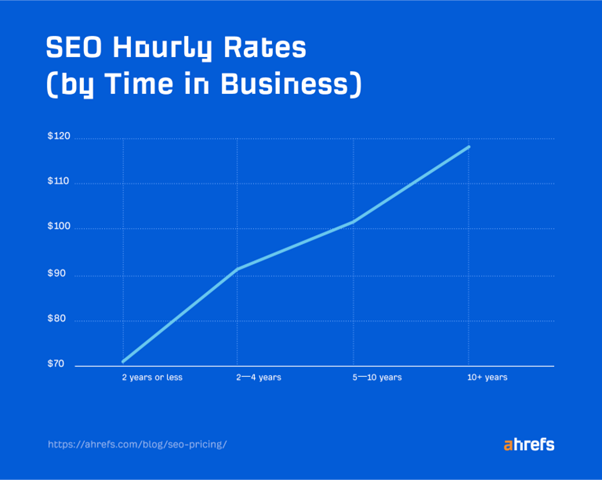
It’s often worth paying a premium for the expertise of an established company. Experienced SEO professionals can significantly impact the cost and effectiveness of your SEO strategy. But make sure they have something to show for all that time in the industry. A successful SEO agency should be able to show you several success stories from previous clients.
A high-quality SEO firm will also have a solid reputation. So, take your time looking through reviews and pay attention to agencies that have won industry awards.
The scope of the SEO project also matters. Does your website have thousands of pages (common for ecommerce sites) or just a few? How much new content do you want to create? And what’s the current state of your site’s backend? If you’re only looking for on-page optimization, your SEO package will probably be cheaper than one that also includes technical SEO and link-building.
Finally, your industry and the strength of your competition also affect SEO pricing. If you operate in a particularly competitive environment, the scope of your SEO program will need to be bigger.
In conclusion
Here’s the truth: you generally get what you pay for in SEO. A $500/month service can’t deliver the same results as a $5,000/month service because they don’t have the resources, time, or expertise to do so. However, that doesn’t mean you need to max out your budget. The key is matching your investment to your business goals, competition level, and growth timeline. Ask yourself: – How competitive is my industry online? – What’s the potential ROI if I rank on page 1? – How quickly do I need results? – Do I have in-house resources to supplement agency work? – Am I committed to SEO for the long term? Your answers will guide you to the right investment level. And remember, whichever tier you choose, make sure you’re working with a reputable agency that’s transparent about what they can realistically deliver.
Since 2009, we have helped thousands of businesses grow their online leads and sales strategically. Let us do it for you!

